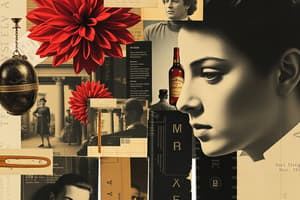Podcast
Questions and Answers
What type of context clue uses an opposite word or phrase to explain a difficult word?
What type of context clue uses an opposite word or phrase to explain a difficult word?
- Antonym Clue (correct)
- Definition Clue
- Example Clue
- Synonym Clue
Imagery in poetry refers to the use of sound-related language.
Imagery in poetry refers to the use of sound-related language.
False (B)
What is the term for giving human characteristics to non-human objects?
What is the term for giving human characteristics to non-human objects?
Personification
A ______ is a comparison between two unlike things using 'like' or 'as'.
A ______ is a comparison between two unlike things using 'like' or 'as'.
Match the following literary devices with their descriptions:
Match the following literary devices with their descriptions:
Which of the following is an example of a definition clue?
Which of the following is an example of a definition clue?
All poems have a tone that is either playful or serious.
All poems have a tone that is either playful or serious.
What is the purpose of literary devices in poetry?
What is the purpose of literary devices in poetry?
The _________ of a poem refers to the emotional atmosphere it evokes in the reader.
The _________ of a poem refers to the emotional atmosphere it evokes in the reader.
Which of the following best describes an example clue?
Which of the following best describes an example clue?
Flashcards are hidden until you start studying
Study Notes
Context Clues
- Definition Clues: Explains a word's meaning by directly defining it within the sentence or nearby lines.
- Synonym Clues: Uses another word with the same meaning to clarify the unfamiliar word.
- Antonym Clues: Uses a contrasting word or phrase to highlight the meaning through opposite concepts.
- Example Clues: Provides examples that illustrate the meaning of the difficult word.
- Explanation Clues: Offers a detailed explanation of the word within the surrounding text.
Literary Devices
- Enhance writing by adding complexity, emphasis, and sensory experiences for the reader.
- Imagery: Descriptive language appealing to the senses (sight, sound, smell, taste, touch) to create vivid mental pictures.
- Metaphor: A direct comparison between two unlike things without using "like" or "as" to suggest a shared characteristic.
- Simile: A comparison between two unlike things using "like" or "as".
- Personification: Giving human characteristics to non-human entities (objects, animals, abstract concepts).
- Symbolism: Objects, colors, or elements representing deeper meanings beyond their literal significance.
- Rhyme: Repetition of similar sounds, often at the ends of lines in poetry.
- Tone: The writer's attitude conveyed through diction, imagery, syntax, and overall style (e.g., playful, serious, nostalgic, melancholic, sarcastic, hopeful, reflective).
- Mood: The emotional atmosphere or feeling evoked in the reader by the poem (joyful, celebratory, dark, ominous).
- Alliteration: Repetition of initial consonant sounds in a series of words.
- Hyperbole: An exaggeration used for emphasis and effect.
- Onomatopoeia: Words imitating the sounds they represent.
Studying That Suits You
Use AI to generate personalized quizzes and flashcards to suit your learning preferences.




